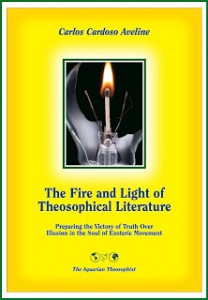
Brotherhood is Fundamentally a
Plane of Perception, an Attitude of Mind
John Garrigues

J. Garrigues (1868 – 1944)
“Nothing can be unbrotherly as fact which is
true, however unpalatable that truth may be.”
Theosophists of every degree of interest and enlightenment accept without question the great ideas of Brotherhood, of charity and tolerance.
Aye, there’s the rub – we accept these ideas without question, whereas our Spiritual education must begin of necessity with rigorous self-examination – not of our conduct, but of the ideas on which our conduct is based. What ideas are more fundamental than those which govern our relations with our fellows, with the visible and invisible Nature which envelops us, and of which we are integral and inseparable Units?
All men without exception have their own ideas on these great subjects. Are those ideas complete, inclusive, unvarying – or are they qualified, held with reservations, therefore variable?
The moment the thoughts are turned inward on this great question of Brotherhood, an immediate conjunction of Buddhi and Manas, of the Higher and the Lower principles, comes about. It is still the same man, but he is no longer a house divided against itself. The conjunction does not occur by any miracle, nor can it be brought about by any outside force or influence. It is purely an act of the Will – of the Spiritual will.
Brotherhood, from this point of view, is universal: from any other point of view whatsoever, brotherhood becomes a misnomer, a shadow, and involves an immediate descent to a lower plane of perception, the plane of Duality, of “the great paradox”, of “the pairs of opposites”.
What does this mean?
It means our failure to exercise the Spiritual will: in consequence, our universe is divided by the horizon we have ourselves imposed. It consists of those who are for us and those who are against us – of those who are for or against us! This is the “heresy of separateness”, the personal point of view versus the impersonal, and is the common estate of all men; a state from which each individual Man must extricate himself, if he is to be extricated at all.
Brotherhood, then, for each individual, is fundamentally a point of view, a plane of perception, an attitude of mind, which he can assume or set aside at will. To see this, to rise to this, to struggle to maintain this attitude of mind, to return to it as soon as may be when we have fallen from it – this is Chelaship, according to H. P. Blavatsky and her Masters.
There is no such thing as Christian brotherhood, or Buddhist brotherhood, or Theosophical brotherhood: there is Brotherhood – or its shadow, an association of men with partial, and therefore separative aims, purposes, and objects. Any and all Religions necessarily represent mere sectarianism, because they rest upon divisions, not upon unity. Equally of necessity each religion is a breeder of sects – of divisions within its own segmentation.
This is not a religious universe, any more than it is a scientific universe. It is a universe of Law. That Law has been variously stated, but in essence it means that each being acts according to his own acquired nature, and in no other way – until he learns better. Progress, then, is not through opinion, belief, force, or influence of any kind exercised from without, but solely through education. And again, all education is self-education. All associations are but means of education. If the Will is lacking, no association can benefit the individual in a moral or spiritual sense.
No association of men ever had nobler, grander, more inclusive, and therefore more educative possibilities for its members than the Parent Theosophical society. Were those opportunities availed of, while the Fellows had the priceless opportunity of direct contact with the Teacher and her Teachings? [1] After thirteen years of this association, she pronounced the Society a “dead failure” and a “sham” – so far as devotion to its professed Objects was concerned. Was her judgment “unbrotherly”?
Nothing can be unbrotherly as fact which is true, however unpalatable that truth may be. Was she unbrotherly in a moral or spiritual sense because she recognized the fact, and declared it unmistakably to the very ones responsible for it? They thought so – and acted accordingly. They held it against her for telling them disagreeable facts. Did she hold it against them for their failure? Did she stop working, or leave the straight and narrow Path because of what others said and did?
There is a great lesson in the meaning of Universal brotherhood here – a lesson for Theosophists today to study and apply to the existing ferment among the numerous theosophical societies. All long for “brotherhood” – without giving up their sectarian affiliations. Is this a renaissance of the Brotherhood of H.P.B., or a recrudescence of the “brotherhood” that split the Parent society into sectarian fragments?
It is an opportunity for Theosophists either to rush headlong into a new “land of Promise” – and promises – or to question our several interpretations of Universal Brotherhood.
NOTE:
[1] John Garrigues is here referring to Helena P. Blavatsky.
000
The above article was first published at the December 1930 edition of “Theosophy” magazine, Los Angeles, pp. 49-51, with no indication as to its author. Original title: “Tolerance”. It is here reproduced from “The Aquarian Theosophist”, March 2013 edition.
000
On the role of the esoteric movement in the ethical awakening of mankind during the 21st century, see the book “The Fire and Light of Theosophical Literature”, by Carlos Cardoso Aveline.

Published in 2013 by The Aquarian Theosophist, the volume has 255 pages and can be obtained through Amazon Books.
000